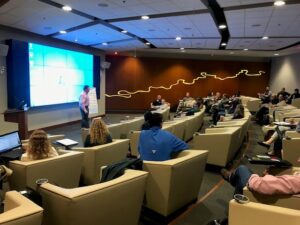
NCCOS staff led a workshop in Alabama this month to address the status of water quality data required for restoration and conservation activities tied to the RESTORE Act, developed in the aftermath of the Deepwater Horizon oil spill. The workshop brought together 30 water quality experts and data users from federal, state, non-governmental, and academic entities in the five gulf states. The workshop sought input from participants about the current state of water quality monitoring, data gaps and availability, and collection standards in the gulf.
The RESTORE Act created the Gulf Coast Ecosystem Restoration Council, which is responsible for developing and implementing a comprehensive plan to restore the gulf ecosystem. With funding from the council, NOAA and USGS are compiling gulf water quality monitoring information that the council will use to measure the success of restoration activities funded by the RESTORE Act. NOAA and USGS are leveraging existing resources, capacities, and expertise to build on existing data and programs that will enable the council to achieve science-based decision-making and comprehensive gulf ecosystem restoration.
For more information, contact Randy.Clark@noaa.gov.
